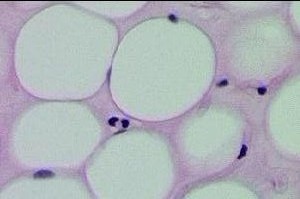TUESDAY, 14 SEPTEMBER 2010
In a study published in the FASEB journal [1], American researchers focused on the cell-differentiating function of protein Sprouty1 in mice. The protein acts as a switch in stem cells, which have the ability to differentiate into a variety of specialised cells. Sprouty1 thus encourages the stem cell to turn into a bone-making cell instead of a fat-storing cell.The team genetically engineered mice to either be Sprouty1 deficient or to have the protein in excess. Compared to controls, the former has more body fat and less dense bones, while the latter had the inverse effect. Looking at the mice tissue under a microscope, in the enhanced group, less cells were available for storing fat. The increased amount of Sprouty1 made those cells differentiate into bone-making cells, causing bone mass and density increases.
With obesity being a global epidemic, research on this protein can help, first, by potentially developing new treatment methods to mimic the effects of Sprouty1. New screening methods, too, may become more plausible for those who are genetically predisposed to obesity.
Written by Wing Ying Chow

